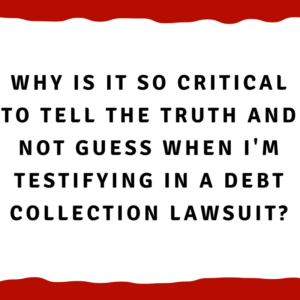Why is it so critical to tell the truth and not guess when I’m testifying in a debt collection lawsuit?
“Why is it so critical to tell the truth and not guess when I’m testifying in a debt collection lawsuit?”
 So you’re in a debt collection lawsuit, you have a trial coming up, and you’re probably wondering how you testify in this case.
So you’re in a debt collection lawsuit, you have a trial coming up, and you’re probably wondering how you testify in this case.
What should I do if I don’t know the answer to the question they ask?
Here’s the bottom line.
Tell the truth.
Everything we talk about in this article is based on this fact.
That means that you stay within the parameters of the truth.
Don’t exaggerate the truth.
Another way to look at this is, “What if I don’t know the answer?”
Be truthful.
Let’s talk about some different examples.
Let’s say debt collector asks you in the debt collection lawsuit trial, “Isn’t it true that you used this credit card at least 10 times?”
You know you’ve used that card more than 10 times, so you say no.
That isn’t true.
Or, let’s say that you only used the card once, and they ask if you’ve used the card more than 10 times.
If you say that you have used it more than 10 times, then you’re exaggerating the truth.
You don’t want to do that.
You want to tell the truth.
Here’s where telling the absolute truth comes in.
The debt collector will ask you questions that you have no idea about.
They’ll say things like, “Isn’t it true that X company bought the debt from Chase, Captial One, etc?”
How in the world would you know that?
They’re asking you about something that you have no knowledge of.
The court rules demand that you only answer truthfully to questions that you know the answer to.
Have they shown you every single document of their transaction?
We don’t mean that they’ve shown you the first page of the bill of sale, but the actual agreement they signed to acquire your debt.
If they have, then you’re the first person to see it.
The debt collector doesn’t even let their lawyers see that agreement. They think it’s some sort of top secret information.
Without that information, how would you know the answer to their question?
If they ask you whether or not they bought the debt, you can say, “I don’t know.”
Because you can’t testify to something you don’t know about.
It doesn’t matter if the lawyer yells at you, speaks to you in a condescending manner, or if the lawyer insults you. If you don’t know the answer, then you say that you don’t know.
If they ask you a question and you don’t remember what the correct answer is, then say that you don’t remember.
They might ask, “Isn’t it true that you used this card on May 3rd, 2013 to pay a bill of $45 at Walmart?”
If you remember that event and you did use that card (which if you do remember, then I’m very impressed), then say yes. If you know that you didn’t use that card, then say no.
Or, if you’re like most of us and don’t remember that far back, then tell the lawyer that you don’t remember.
That’s the truthful answer.
All of this comes back to telling the truth.
You need to uphold your obligation because you raised your hand and swore/affirmed to tell the truth and nothing but the truth.
Don’t make things up.
I’ve seen people in these debt collection lawsuits who, whether they have a lawyer representing them or are representing themselves, will be questioned by the collection lawyer.
When they’re being questioned, the collection lawyer will say, “Isn’t it true we own this debt?”
The client/consumer will say, “Well, I don’t know about that…”
The collection lawyer will go, “Of course we do. Do you think that we would bring the lawsuit against you if we didn’t?”
Unfortunately, the consumer will agree with the collection lawyer and boom, the debt collector owns the debt.
They won’t even have to prove that they own it because the consumer admitted it.
So don’t guess.
Don’t speculate.
Tell. The. Truth.
Hope this has been helpful to you.
If you’ve already hired a lawyer for your debt collection lawsuit, definitely get in touch with them if you have any questions.
However, if you’re representing yourself or you have any questions, feel free to get in touch with us.
You can reach us by phone at 1-205-879-2447, or you can fill out a contact form and we will get in touch with you quickly.
We look forward to chatting with you.
Thanks for reading, and have a great day!
P.S. If you’d like to know how to get yourself ready for trial, you can check out our article where we talk about what you should do.
And if you would like to read our series where we answer over 150 questions, here is the first part.